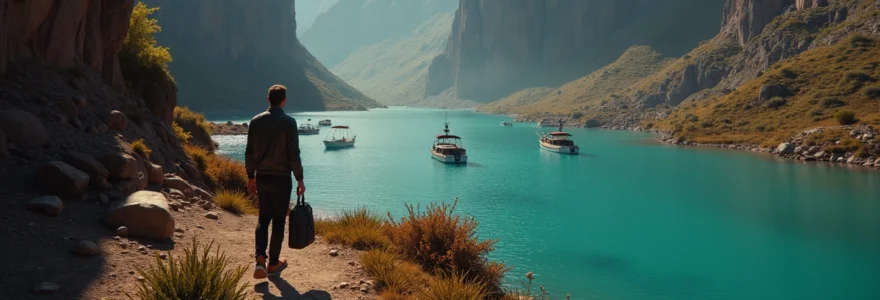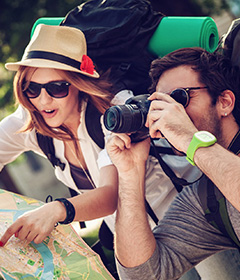Travel has the power to transform us, but not all experiences leave an equal mark on our minds. Unusual destinations and off-the-beaten-path adventures often create the most vivid and lasting memories. This phenomenon isn’t just anecdotal; it’s rooted in cognitive psychology and neuroscience. From remote islands with alien-like landscapes to post-apocalyptic tourist sites, these unconventional spots engage our brains in unique ways, leading to stronger, more enduring recollections of our journeys.
Cognitive psychology behind unusual travel experiences
The human brain is wired to pay attention to novelty. When we encounter unfamiliar environments or situations, our cognitive processes kick into high gear, enhancing our ability to form and retain memories. This heightened state of awareness is particularly evident when we venture into unusual travel destinations.
Hippocampus activation and novel environmental stimuli
The hippocampus, a crucial brain region for memory formation, becomes significantly more active when exposed to novel stimuli. When you explore an unusual travel spot, your hippocampus works overtime to process and store the unique information it’s receiving. This increased activity leads to stronger neural connections, effectively “burning” the experience into your long-term memory.
Von restorff effect in travel memory formation
The Von Restorff effect, also known as the isolation effect, explains why distinctive experiences stand out in our memories. When you visit a place that’s drastically different from your usual surroundings or previous travel experiences, it creates a mental “bookmark.” This psychological phenomenon ensures that unusual travel spots are more likely to be remembered vividly and for longer periods.
Neurotransmitter release in unfamiliar settings
Exploring unusual destinations triggers the release of neurotransmitters like dopamine and norepinephrine. These chemicals not only enhance mood and alertness but also play a crucial role in memory consolidation. The surge of these neurotransmitters in unfamiliar settings helps cement your travel experiences into long-lasting memories.
Unconventional destinations and memory consolidation
Certain destinations stand out for their ability to create powerful, lasting memories due to their unique characteristics. These places often challenge our perceptions and engage multiple senses, leading to stronger memory consolidation.
Chernobyl exclusion zone: Post-Apocalyptic tourism impact
The Chernobyl Exclusion Zone offers a haunting glimpse into a world frozen in time. As you walk through abandoned buildings and witness nature reclaiming human structures, your brain is constantly processing unfamiliar and emotionally charged stimuli. This intense cognitive engagement leads to stronger memory formation, making a visit to Chernobyl an unforgettable experience.
Slab city, california: Off-Grid living and memory imprinting
Slab City, known as “The Last Free Place in America,” presents a stark contrast to conventional living. The makeshift dwellings, artistic installations, and unique social dynamics of this off-grid community create a sensory-rich environment. When you visit Slab City, the novelty of the experience activates multiple brain regions, enhancing memory imprinting and recall.
Socotra island, yemen: alien landscapes and cognitive anchors
Socotra Island’s otherworldly flora, including the iconic Dragon Blood trees, provides a visual feast unlike anywhere else on Earth. The stark uniqueness of the landscape serves as a powerful cognitive anchor, creating strong mental associations that enhance memory formation. As you explore this alien-like environment, your brain forms robust neural pathways, ensuring the experience remains vivid in your memory.
Svalbard global seed vault: arctic exploration and recall enhancement
Visiting the Svalbard Global Seed Vault combines the thrill of Arctic exploration with the profound significance of global biodiversity preservation. The extreme location, coupled with the vault’s critical mission, creates a multifaceted memory imprint. The unique combination of environmental factors and conceptual importance enhances recall, making it a deeply memorable experience.
Sensory overload in unusual travel spots
Unusual travel destinations often engage multiple senses simultaneously, creating a sensory overload that significantly enhances memory formation. This multi-sensory stimulation activates various brain regions, leading to more comprehensive and vivid recollections.
Olfactory stimulation in dallol, ethiopia’s sulphuric springs
The sulphuric springs of Dallol in Ethiopia present a unique olfactory experience. The strong, distinctive smell of sulphur creates powerful olfactory memories. Scent is closely linked to memory formation, and the unusual odors encountered in Dallol serve as strong memory triggers, enhancing your ability to recall the experience vividly.
Auditory uniqueness of kawah ijen’s blue flame volcano, indonesia
The eerie blue flames of Kawah Ijen volcano are accompanied by unique sounds – the hiss of escaping gases and the crackle of blue fire. This auditory backdrop creates a multisensory experience that engages both visual and auditory memory centers. The combination of sight and sound forms a more complex and enduring memory imprint.
Visual intensity of zhangjiajie national forest park, china
Zhangjiajie National Forest Park, with its towering sandstone pillars and misty landscapes, offers a visual spectacle that challenges your perception of reality. The sheer scale and otherworldly beauty of the scenery create a strong visual imprint. This intense visual stimulation activates large portions of the visual cortex, leading to enhanced memory formation and recall.
Cultural shock and Long-Term memory formation
Experiencing cultural shock in unusual travel destinations can significantly impact long-term memory formation. When you encounter customs, traditions, or ways of life radically different from your own, it triggers a complex cognitive response. This mental challenge forces your brain to create new neural pathways, effectively strengthening the memory of the experience.
Cultural shock often involves emotional responses, which play a crucial role in memory consolidation. The amygdala, responsible for processing emotions, becomes highly active during these experiences. This emotional engagement enhances the vividness and longevity of the memories formed during your unusual travel experiences.
Cultural shock is not just a transient feeling; it’s a powerful catalyst for creating enduring travel memories that shape our understanding of the world.
Moreover, the process of adapting to unfamiliar cultural norms requires active problem-solving and cognitive flexibility. This mental exercise strengthens the neural connections associated with the experience, making it more likely to be stored in long-term memory. As you navigate through culturally distinct environments, your brain is constantly forming new associations and memories, creating a rich tapestry of travel experiences that stay with you long after you’ve returned home.
Risk and adrenaline: neurological impact on travel recollection
The element of risk and the subsequent adrenaline rush in unusual travel spots play a significant role in enhancing memory formation and recall. When you engage in activities or visit places that involve a perceived risk, your body’s stress response system is activated, leading to the release of stress hormones like adrenaline and cortisol.
Neuroplasticity acceleration in High-Risk destinations
High-risk travel experiences can accelerate neuroplasticity, the brain’s ability to form new neural connections. When you push yourself out of your comfort zone in unusual destinations, your brain adapts quickly to new situations. This heightened state of neuroplasticity enhances your ability to form strong, lasting memories of the experience.
Amygdala engagement in extreme travel scenarios
The amygdala, crucial for processing emotions and storing memories associated with emotional events, becomes highly active during risky or adrenaline-inducing travel experiences. This increased amygdala activity leads to the formation of particularly vivid and long-lasting memories. When you recall these experiences later, the emotional intensity associated with them often makes the memories feel fresh and immediate.
Cortisol and epinephrine release in adventurous settings
Adventurous travel experiences trigger the release of cortisol and epinephrine (adrenaline). These hormones not only prepare your body for action but also play a crucial role in memory consolidation. The presence of these stress hormones in your system during unusual travel experiences helps to “stamp” the memories more firmly in your brain, making them more resistant to fading over time.
Digital detox travel and enhanced mindfulness in memory creation
In our hyper-connected world, unusual travel spots that offer opportunities for digital detox can significantly enhance memory formation through increased mindfulness. When you disconnect from technology and immerse yourself fully in your surroundings, your brain engages more deeply with the present moment, leading to stronger memory imprints.
Digital detox destinations often coincide with unusual or remote locations, further amplifying their impact on memory creation. Without the constant distraction of devices, your senses become more attuned to the unique aspects of your environment. This heightened sensory awareness contributes to more detailed and vivid memories of your travel experiences.
Disconnecting from technology in unusual travel spots doesn’t just refresh the mind; it creates a fertile ground for forming rich, enduring memories.
Moreover, the absence of digital distractions allows for deeper social connections and more meaningful interactions with local cultures and environments. These authentic experiences engage emotional and social processing centers in the brain, further enhancing memory consolidation. As you focus more on your immediate experiences without the filter of social media or constant connectivity, you’re more likely to form genuine, lasting memories that truly capture the essence of your unusual travel adventures.
The impact of unusual travel spots on memory formation is a fascinating interplay of cognitive psychology, neuroscience, and unique environmental stimuli. From the activation of the hippocampus in novel settings to the release of memory-enhancing neurotransmitters, these experiences create robust, long-lasting memories. Whether it’s the sensory overload of alien landscapes, the cultural shock of unfamiliar traditions, or the adrenaline rush of adventurous pursuits, unusual destinations engage our brains in ways that ordinary travel simply cannot match. By seeking out these unconventional experiences, you not only broaden your horizons but also create a rich tapestry of memories that will stay with you for a lifetime, shaping your understanding of the world and yourself.


